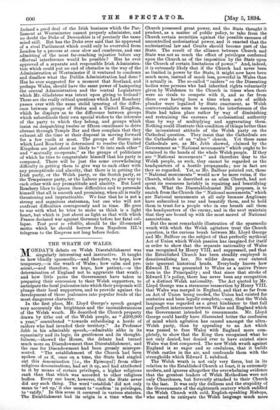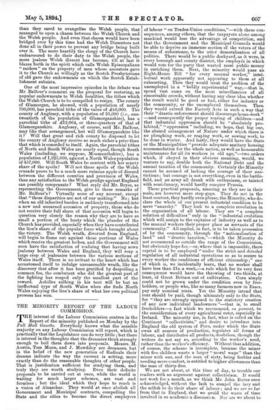THE WRATH OF WALES.
MONDAY'S debate on Welsh Disestablishment was singularly interesting and instructive. It taught us how blindly spasmodic,—and therefore, we hope, how temporary,—is the wrath of Wales ; how calm and pre- scient,—and therefore, we hope, how patient,—is the determination of England not to aggravate that wrath ; and how little pains the Government have taken in preparing their concession to their Welsh supporters, to anticipate the local jealousies into which their proposals will plunge their local supporters, and to provide against the development of those jealousies into popular feuds of the most dangerous character. In the first place, Mr. Lloyd. George's speech gauged very accurately the brightness and the inconsiderateness of the Welsh wrath. He described the Church property drawn by tithe out of the Welsh people, as " X200,000 a year," contributed " towards subsidising a horde of raiders who had invaded their territory." As Professor Jebb in his admirable speech,—admirable alike in its equanimity and its logic, its gentleness and its thought- fulness,—showed. the House, the debate had turned much more on Disendowment than Disestablishment, and the case for Disendowment had been grossly misrepre- sented. "The establishment of the Church had been spoken of as if, once on a time, the State had singled out this denomination [i.e., the Episcopal] from other religious denominations, had set it up, and had attributed to it by means of certain privileges, a higher religious rank than that which was accorded. to other religious bodies. Every one knew, however, that the State never did any such thing. The word establish' did not only mean to set up,' it also meant to confirm' in privileges, to ' ratify.' In this sense it occurred in various statutes. The Establishment had its origin in a time when the Church possessed great power, and the State thought it prudent, as a matter of public policy, to take from the Church certain securities against the possible excesses of uncontrolled ecclesiastical power, and it enacted that the ecclesiastical law and Courts should become part of the State. The result of the alliance between Church and State was not so much the effect of privileges conferred upon the Church as of the imposition by the State upon the Church of certain limitations of power." And, indeed, it is extremely likely that if the Church had never been so limited in power by the State, it might now have been much more, instead of much less, powerful in Wales than it actually is. The so-called " raiders " on the Dissenting bodies were persons who had inherited rights voluntarily given by Welshmen to the Church in times when there were no rivals to compete with it, and so far from there ever having been a time when acts of selfish plunder were legalised by State enactment, as Welsh controversialists seem to assume, the interference of the State had taken place rather by way of diminishing and restraining the excesses of ecclesiastical authority than by way of multiplying and aggravating them. Nothing could illustrate this condition of things better than the inconsistent attitude of the Welsh party on the Cathedral question. They insist that the Cathedrals are the Cathedrals of an "alien" church. Yet these same Cathedrals are, as Mr. Jebb showed, claimed by the Government as " National monuments " which ought to be retained in the hands of the whole Welsh people. If they are "National monuments " and therefore dear to the Welsh people, as such, they cannot be regarded as the headquarters of a hostile propaganda; nor in fact are they so regarded. Yet, as Mr. Balfour pointed out, these " National monuments " would now be mere ruins, if the Church, which is described as an alien Church, had not spent its resources lavishly in repairing and beautifying them. What the Disestablishment Bill proposes, is to snatch from the Church the " National monuments," which are National monuments at all only because Anglicans have subscribed to rear and beautify them, and to hold them in trust for a people who in one breath call them the headquarters of the enemy, and in the next maintain that they are bound up with the most sacred of National associations.
But the most remarkable illustration of the spasmodic wrath with which the Welsh agitators treat the Church question, is the curious brush between Mr. Lloyd. George and Mr. Balfour on the subject of that perfectly mythical Act of Union which Welsh passion has imagined for itself in order to show that the separate nationality of Wales was recognised by Henry VIII. and suppressed, and that the Established Church has been steadily employed in denationalising her. No wilder dream ever entered into ignorant historical heads. Everybody knows how Edward II. was presented to Wales as a native Prince born in the Principality ; and that since that stroke of Edward L's policy, there has never been any recognition of a distinct Welsh nationality. The Act quoted by Mr. Lloyd George was a strenuous reassertion by Henry VIII. that Wales was merged in England, and that so far from an Act of Union being needed, the Union had existed for centuries and been legally complete,—nay, that the Welsh language was regarded as a great hindrance to that full and perfect intercourse between Wales and England which the Government intended to consummate. Mr. Lloyd George could hardly have illustrated better the confusion of mind which agitation has caused amongst the ultra- Welsh party, than by appealing to an Act which was passed to fuse Wales with England more com- pletely, to show that the King then recognised what he not only denied, but denied ever to have existed since Wales was first conquered. The new Welsh wrath against England is so eager and so credulous, that it builds Welsh castles in the air, and confounds them with the strongholds which Edward I. subdued.
The Welsh wrath is not only very fierce, but in its relation to the Established Church at least, it is extremely modern, and ignores altogether the overwhelming evidence that the greatest leaders of Welsh Methodism were not only Churchmen, but fervently attached to their Church to the last. It was only the dullness and the stupidity of the Governments of the eighteenth century which saddled the Welsh Church with cold, English-speaking Bishops, who cared to extirpate the Weigh language much more than they cared to evangelise the Welsh people, that managed to open a chasm between the Welsh Church and the Welsh people. And even that chasm would have been bridged over by this time had the Welsh Dissenters not done all in their power to prevent any bridge being built over it. The more heartily the clergy of the Church have endeavoured to do their duty to the Welsh people, the more jealous Welsh dissent has become, till at last it blazes forth in the spirit which calls Welsh Episcopalians " raiders " on the property of men whose ancestors gave it to the Church as willingly as the Scotch Presbyterians of old gave the endowments on which the Scotch Estab- lishment subsists.
One of the most impressive episodes in the debate was Mr. Balfour's comment on the proposal for restoring, as popular endowments to Welsh localities, the tithes which the Welsh Church is to be compelled to resign. The county of Glamorgan, he showed, with a population of nearly 700,000, has parochial tithe of the value of £16,000. The county of Anglesey, with a population of 35,000 (i.e., one- twentieth of the population of Glamorganshire), has a parochial tithe of £12,064, or three-quarters of that of Glamorganshire. Anglesey, of course, said Mr. Balfour, may like that arrangement, but will Glamorganshire like it ? Will that great and rich county be disposed to let the county of Anglesey receive so much richer a prize than that which is conceded to itself. Again, the parochial tithes of North and South Wales are nearly equal, though South Wales (including, we suppose, Monmouthshire), has a population of 1,325,000, against a North Wales population of 457,000. Will South Wales be content with her scanty share of the spoils? Will not these spoils of the Welsh crusade prove to be a much more ruinous apple of discord between the different counties and provinces of Wales, than any satisfaction to the Welsh grudge against England can possibly compensate ? What reply did Mr. Bryce, as representing the Government, give to these remarks of Mr. Balfour's ? Virtually none of any account, except that "these disparities are not of our making." No; but when an old inherited burden is suddenly transformed into a new and unearned accession of property, those who do not receive their full share of that accession will begin to question very closely the reason why they are to have so small a portion of the booty which the plunder of the Church has provided, especially when they have contributed the lion's share of the popular force which brought about the victory. The Welsh wrath, diverted from England, will begin to flame out against those portions of Wales which receive the greatest bribes, and the Government will soon have the satisfaction of realising that having sown jealousy between Wales and England, they will reap a large crop of jealousies between the various sections of Wales itself. There is no irritant to the heart which has accustomed itself to indulge unreasonable wrath, like the discovery that after it has been gratified by despoiling a common foe, the combatant who did the greatest part of the fighting has reaped only the smallest part of the reward. Achilles sulking in his tent will be but an ineffectual type of South Wales when she finds North Wales enjoying the lion's share of what her own political prowess has won.







































 Previous page
Previous page